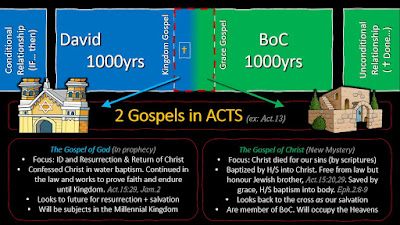Understanding and Interpreting the Bible (Part 3)
Understanding and Interpreting the Bible
(Part 3 --- Dividing the REALMS)
In previous posts of this study, we have investigated the NEED to recognize divisions in the Bible. We have also determined the PURPOSE for divisions in the Bible. It is important to remember that the purpose for dividing the Word originates in all things to do with Israel. In this post we will have a look at the first of three overarching 'Israel related' categories that need to be rightly divided in God's greater redemption plan. Within the three categories of (1) Realms, (2) Agencies, and (3) Programs, we will start by dividing the REALMS; defined by phrases like, heaven and earth, and spiritual and physical.Genesis 1:1 famously starts with the statement, "In the beginning, God created the heavens and the earth...". In the context of this verse, we know that the heavens and the earth are the physical realms that God created. However, as we progress through this study, and in context with the verses we will target, you will notice that the words, heaven and earth, as well as starts, sand, spiritual and physical can represent different things. The context of the verse is important and will clarify whether the meaning represents the physical creation, or angels (demons) or actual celestial bodies, or even two different people groups. This will become evident as we progress. I'm simply giving you a heads up.
Creation is under a curse
Because of sin in Eden, the earth was placed under a curse. I doubt I need to confirm this statement, but let's just use the following verse to verify that fact,
Isa.24:6 Therefore a curse has consumed the earth, and its inhabitants must bear the guilt;
For additional proof, Gen.3:14-19 attests to the very origin of this state.
It's not hard to get agreement on this fact, but it's a lesser know fact that the heavens are under a curse too? The created heavens themselves are also under a curse because of angelic rebellion. The book of Job provides some interesting insights,
Job 15:15 Behold, He [God] puts no trust in his saints [angels]; yea, the heavens are not clean in His sight.
Job 25:4 How then can man be righteous before God? Or how can he be pure who is born of a woman? 5 If even the moon does not shine, and the stars are not pure in His sight, 6 How much less man, who is a maggot, and a son of man, who is a worm?
What do these statements mean? These verses in Job might be understood to refer to celestial bodies, but in the proper context, they refer to angels [angelic saints], and more specifically, to fallen angels.
In the new testament, in Eph.6:12 the Apostle Paul speaks of "...spiritual wickedness in high places." "High places" is synonymous with "heavenly places" (Eph.1:3; Eph.2:6). Outer space is filled with the activities of Satan and his minions. Eph.2:2 calls Satan "...the prince of the power of the air."
So, as we can tell, God's creation, including humanity, needs salvation, and needs to come back into the same state it was designed to be in, perfect, pure and undefiled. It is God's redemption plan will accomplish this, but it is this very plan that introduces the nation of Israel who, throughout scripture, are to be kept apart from all other nations further validating the need for rightly dividing.
Numbers 23:9 For from the top of the rocks I see him, and from the hills I behold him: lo, the people [Israel] shall dwell alone, and shall not be reckoned among the nations.




Comments
Post a Comment